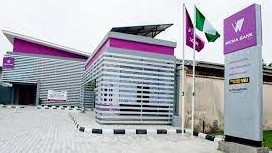BUSINESS
COVID-19: W/Bank, AU Partner to Deploy 400m Vaccine Doses in Africa

By Tony Obiechina, Abuja
The President of the World Bank, Mr David Malpass, and his senior
management team comprised of Dr Axel van Trotsenburg and Dr Makhtar
Diop met with the African Union’s COVID-19 Vaccine Acquisition Task
Team (AVATT) to discuss modalities for a partnership that will
accelerate vaccine deployment to Africa.
In a historic COVID-19 vaccine procurement agreement signed on 28
March 2021, the AVATT had previously successfully secured up to 400
million doses of the Johnson and Johnson single-shot COVID-19 vaccine
with the support of the African Export-Import Bank (Afreximbank).
“In providing a $2billion guarantee on behalf of the African Union
member states, we were able to help put Africa in a strong negotiating
position with producers as we negotiated vaccine procurement. It was
obvious to us at AVATT that no deal will have been possible without a
strong financial backing,” the President of Afreximbank, Prof Benedict
Oramah said.
“The Johnson and Johnson doses are a critical step towards the
continental goal of vaccinating at least 60 per cent of Africans.
Reaching this target is a prerequisite to saving African lives and
livelihoods, safely reopening our economies and resuming our economic
development agenda,” said Dr John N Nkengasong, Director of the
African Centres for Disease Control and Prevention (Africa CDC) and
Member of the AVATT.
With over 41 countries at different stages of finalising their orders
for purchasing the vaccine and with vaccination momentum growing, it
is essential that countries feel they can get sufficient doses quickly
and in an affordable way.
The World Bank’s decision to partner with AVATT on the heels of the US
announcement about dose sharing means countries can be assured they
can both access and finance the vaccines they need,” said Mr Strive
Masiyiwa, African Union Special Envoy and coordinator of the AVATT.
Under the AVATT structure, AU Member States are allocated vaccines
according to the size of their populations for purchase through a
pooled procurement mechanism. These vaccines complement the vaccines
offered through the COVAX Facility, which has set out to deliver
vaccines for up to 30 per cent of participating countries’
populations, to enable the AU Member States to reach the continental
target.
President Cyril Ramaphosa of the Republic of South Africa, in his
capacity as Chair of the African Union, established the AVATT on 6
November 2020 and mandated it to ensure equitable access to COVID-19
vaccines for AU Member States and provide the required financing.
The World Bank team and the AVATT team agreed to fast track all
administrative procedures in order to ensure vaccines get into
countries as early as possible.
Once the vaccines arrive in the Member States, additional efforts will
be required to support their deployment. This includes in-country
distribution (logistics and storage in line with the cold-chain
requirements), securing the required systems, capacities and
capabilities for vaccination.
It also includes targeted research and campaigns to identify and
address vaccine hesitancy through clear and targeted risk
communication and community engagement. These activities will require
a significant lift by countries; the additional support is going to be
critical.
Looking forward, Ms. Vera Songwe, United Nations Under Secretary
General and Executive Secretary of the United Nations Economic for
Africa (ECA) recalled that the pandemic served to expose
vulnerabilities already existing in Africa’s health systems which
were well document in the ECA’s Health and Economic Growth in Africa
(HEGA) report in 2019.
She noted that the African Continental Free Trade Area (AfCFTA) now
provides the platform for building a resilient and inclusive health
system, with local production of vaccines, medicines and medical
equipment on the continent.
BUSINESS
Mobile Phone Association Pillar of Modern Commerce, Driving communication, Says Mamas

From Ayinde Akintade, Osogbo
The National President of Association of Mobile Phone and Allied Products Traders of Nigeria (AMPAT), Hon. Musa Mamsa, has attributed the mobile phone and allied products sector as one of the strongest pillars of modern commerce, driving communication, digital trade, financial inclusion, and security.
Mamsa, who described the group as a crucial link to the sustainability of the digital economy, disclosed this in Osogbo during the inauguration of the Osun State Chapter executives of the association.
According to him, the group is not just contributing to the gross domestic product of the country but also a major employer of youths across the country.
He described the traders, technicians, distributors, and innovators in the sector as the major contributors to society.
“The mobile phone and allied products sector has become one of the strongest pillars of commerce in modern society. From communication to digital trade, from financial inclusion to security, mobile technology drives the engine of today’s world,” he said.
Mamsa commended the Osun Chapter for its resilience and unity despite past challenges, including the global pandemic.
He urged the newly inaugurated executives to uphold the association’s constitution, protect members’ welfare, work in harmony with government agencies, security institutions, and community leaders, and promote peace among traders.
Mamsa also appreciated the Osun State Government for supporting business communities and expressed readiness to partner with authorities to promote peace, economic development, and technological empowerment.
In his address, the newly inaugurated chairman, Oseni Taofeek, promised to place members’ welfare at the centre of his administration while strengthening unity and promoting growth within the association.
While thanking members of AMPAT for the opportunity to serve, Taofeek said, “We will tackle challenges, seize opportunities, and work tirelessly to promote trade and commerce.”
| ReplyReply allForwardAdd reaction |
BUSINESS
Nigeria’s Merchandise Trade Grows to N38.9trn in Q3 2025

By Tony Obiechina, Abuja
Nigeria’s total merchandise trade increased to N38.9 trillion in the third quarter of 2025, reflecting positive momentum in the nation’s import-export performance even in the face of global economic uncertainties.
The latest ‘Foreign Trade in Goods Statistics Q3 2025’ report by the National Bureau of Statistics (NBS) released on Thursday indicated that the Q3 merchandize trade value grew by 8.
71% year-on-year from the N35. 8 trillion recorded in the corresponding quarter of 2024 but 2.36% rise compared to the N38.04 trillion value recorded in Q2, 2025.In the quarter under review, the trade data showed that exports accounted for 58.
59% of total trade with a value of N22.8 trillion, showing an increase of 11.08% over the N20.54 trillion value recorded in the corresponding quarter of 2024, and by 0.28% compared to the N22.75 trillion value recorded in Q2, this yearAccording to the NBS, crude oil remained Nigeria’s dominant export commodity in Q3 2025, with a value of N12.81 trillion, representing 56.14% of total exports for Q3 2025.
The import-export trade reflected that non-crude oil exports totalled N10.01 trillion, accounting for 43.86% of total exports, and in this category, non-oil products contributed N2.9 trillion, or 13.14% of total exports.
A further analysis of the merchandize trade data in the quarter under review revealed that agricultural produce exports amounted to N786.62 billion, reflecting an 11.69% decline from N890.72 billion in Q3 2024 and a 37.39% drop compared to N1.26 trillion in Q2 2025, while Raw material exports were valued at N1.04 trillion, representing a 136.38% increase from N439.82 billion in Q3 2024 and a 26.83% rise compared to N819.72 billion recorded in the preceding quarter.
Also, Solid mineral exports amounted to N100.81 billion, showing a 29.75% increase from N77.70 billion in Q3 2024 and an additional 30.41% growth from N77.31 billion reported in the preceding quarter.
The data further showed that the value of manufactured goods exports stood at N978.53 billion, reflecting a 6.03% decline from N1.04 trillion in Q3 2024. However, compared to Q2 2025, the Q3 2025 value represented a 21.74% increase over the N803.81 billion recorded in the previous quarter.
The statistics agency reported that Exports of other oil products in Q3 2025 totalled N7.01 trillion, showing 51.72% rise from N4.62 trillion in Q3 2024, but dipping by 9.42% from the N7.74 trillion recorded in Q2 2025.
Overall, the exports data for Q3 2025 reflected a mixed performance across sectors, with strong gains in raw materials and solid minerals contrasting declines in agricultural exports and some oil-related categories.
On the import side, the data showed that Imports accounted for 41.41% of Nigeria’s total trade in the quarter under review, peaking at N16.12 trillion and representing 5.51% increase from the N15.28 trillion recorded in Q3 2024, and 5.47% rise compared to N15.29 trillion in the preceding quarter.
Despite the growth in imports, Nigeria maintained a positive merchandise trade balance in Q3 2025.
Specifically, the NBS reported that the nation’s trade surplus stood at N6.69 trillion, but represented 10.36% decline from the N7.46 trillion recorded in Q2 2025, due to the faster pace of import growth relative to exports.
On the merchandise trade based on the countries traded with, the NBS data showed that on the import side, China remained Nigeria’s leading trading partner in Q3 2025, followed by the United States, India, the United Arab Emirates, and Belgium.
According to the data, the most imported commodities during the quarter included petroleum oils and oils obtained from bituminous minerals (crude), gas oil, premium motor spirit (petrol), durum wheat, and cane sugar intended for sugar refining.
On the export side, Nigeria’s top five trading partners were India, Spain, France, the Netherlands, and Italy. The major commodities exported to the countries during the quarter under review comprised crude oil, natural gas, other petroleum gases in a gaseous state, kerosene-type jet fuel, and urea, whether or not in aqueous solution.
Analysts believe that the trade surplus recorded by Nigeria during the quarter was reflective of the improving performance of the economy as the government continued to consolidate on the modest achievements of the nation’s monetary and fiscal policy reforms.
For instance, they maintained that the higher trade volumes pointed to improved production levels, stronger demand for Nigerian commodities, and greater activity at the ports while the increase in total exports demonstrated the resilience in the country’s main revenue-generating sectors.
BUSINESS
CBN Revamps Agric Guarantee Scheme, Targets Smallholder Farmers

The Central Bank of Nigeria (CBN) has launched a major overhaul of the Agricultural Credit Guarantee Scheme Fund (ACGSF), unveiling a new strategic direction aimed at expanding credit access to smallholder farmers and accelerating national food security efforts.
Speaking in Abuja at the inauguration of the reconstituted ACGSF Board, CBN Governor, Olayemi Cardoso, described the revamp as “a new dawn” for agricultural financing.
He said the initiative reflects the Federal Government’s renewed commitment to reposition agriculture as a driver of inclusive growth, rural development, and economic diversification.Cardoso noted that the ACGSF-established in 1977-remains one of the country’s most impactful development finance tools.
Yet, despite employing nearly two-thirds of Nigeria’s labour force and contributing over 20 per cent to GDP, the agric sector continues to receive less than five per cent of total bank credit. This structural mismatch, he said, has stunted the potential of millions of farmers for decades.The CBN governor stressed that the agricultural landscape has evolved far beyond subsistence farming, now governed by integrated value chains, technology, climate risks and a growing agritech ecosystem. In line with these realities, he said the Scheme must transform into a dynamic, data-driven institution capable of supporting modern agriculture.
He highlighted the 2019 amendment that expanded the Scheme’s share capital from N3 billion to N50 billion and broadened its operational scope. One of the notable enhancements, he added, is the inclusion of farmers’ representatives on the new Board-an “inclusive and strategic” move to ensure policies are grounded in real sector needs.
Cardoso emphasised that the central objective of the revamp is to unlock affordable credit for smallholders who account for 90 per cent of the nation’s agricultural output but remain underserved due to limited collateral, poor credit history and weak access to financial services.
He urged the Board, chaired by Dr. Olusegun Oshin, to design products tailored to women, youth and other underserved groups while leveraging fintechs, microfinance banks and cooperatives to deliver innovative lending models. He also called for the deployment of technology-from satellite imagery to digital dashboards-to track loan utilisation and ensure measurable impact.
Dr. Oshin welcomed the reforms and advocated further expansion of the Fund to meet the scale of investment required for meaningful sectoral transformation.
| ReplyReply allForwardAdd reaction |




















